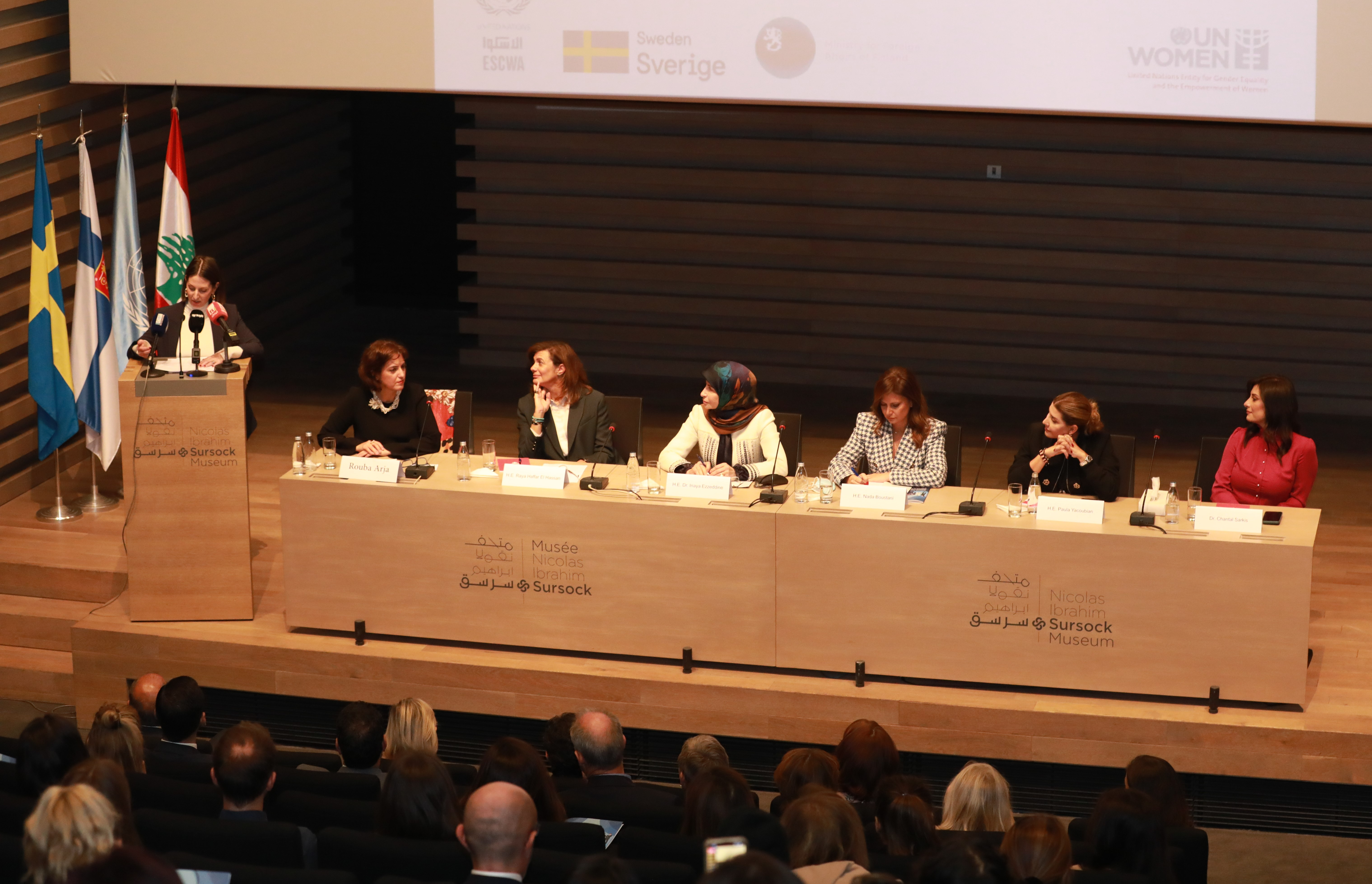Listening to Women in Politics: New report by UN Women and UN ESCWA tells the stories of 7 trailblazing Lebanese women in politics who have broken ‘glass ceilings’
Date:

Beirut, 12 December 2022 – Today, UN Women and ESCWA jointly launched a report on women’s political participation entitled “Women at the Table: Insights from Lebanese Women in Politics”. The report analyses a set of seven in-depth interviews with female Lebanese political actors and explores the challenges and opportunities they faced in office.
Although Lebanese women gained the right to vote in 1952, and despite a vibrant feminist movement, women remain grossly under-represented in public and political life. Out of 88 Lebanese governments formed since 1943, only 9 governments have included women, and today women represent only 4% of the current caretaker cabinet, with one female minister out of 24. Lebanon ranked 110 out of 146 countries in political representation in 2022, according to the World Economic Forum Gender Gap index – though this ranking was assessed when Lebanon had 30% women in cabinet in early 2021 - and is ranked 183 out of 187 countries in terms of women’s participation in parliament. In comparison to its Arab neighbors, the country lags far behind, as it ranks 15th of 17 Arab countries in female parliamentarians.
“In calling for women’s rights, we are not asking for a new agenda, but for an existing one to be honored where hard-won gains of women’s rights are protected, and more investments in lifelong learning, healthcare, decent jobs, and social protection for women and girls are stimulated. Tackling these issues, calling for equality in political representation, requires a united front”, said Mr. Imran Riza, Deputy Special Coordinator for Lebanon, UN Resident and Humanitarian Coordinator in his opening remarks, highlighting the need to consolidate and maximize the gains reaped by the seven Lebanese women who broke through the barriers to political representation.
To better understand the challenging landscape and to provide insight into Women’s political participation in Lebanon, UN Women and ESCWA interviewed seven Lebanese women in politics, between 2020 and 2021, who were ‘firsts’ in their field. The women interviewed for the report are HE. Dr. Inaya Ezzeddine, HE. Raya Haffar El Hassan, HE. Nada Boustani Khoury, HE. Paula Yacoubian, Salam Yamout, HE. Myrna Boustani and Dr. Chantal Sarkis.
“Being the largest financial supporter to UN Women, Sweden wants to ensure that a gender equality perspective is brought into policymaking on a broad front, nationally and internationally. In Lebanon we will continue to support the advocacy of women’s rights and feminist groups to ensure that women from across the Lebanese society have equal opportunity to access political structures and positions of influence. We know that what needs to be done requires political will but also well-designed and effectively implemented gender quotas and long-term strategic work in order to see a real change in the 2026 Lebanese parliamentary elections, together with IMF reforms”, said HE. Ann Dismorr, Ambassador of Sweden to Lebanon.
With support from the Embassies of Sweden and Finland, the report aims to offer policy-makers and practitioners a better understanding of the challenges – and opportunities – that exist when seeking to be a woman in public and/or political office in Lebanon, taking as a starting point that the full and meaningful inclusion of women in leadership and decision-making is a critical prerequisite for genuine democracy and gender equality.
“The stakes and costs of women’s exclusion in the economy and politics are too high to ignore. Lebanon can no longer afford to wait for reforms before taking action on social equality and justice issues. On the contrary, women’s rights, economic empowerment and inclusion in society must be prioritized in reform agenda”, said HE. Anne Meskanen, Ambassador of Finland to Lebanon.
The report calls for the application of temporary special measures in the form of gender electoral quotas, for political parties to put women on their lists, for networks and strong support systems for women in politics, and for support in developing a supportive environment for women in politics, from men and women.
“Poor women’s political participation is a challenge across the region; but the case of Lebanon is very unique due to the overall political environment. Success stories like the ones discussed today give us hope that there is light at the end of the tunnel. We salute all women who were able to break the glass ceiling and encourage those who want to enter into politics but are afraid”, said Ms. Mehirnaz El Awady, Director – Cluster leader, ESCWA.
“Lebanon has a wealth of capable, skilled female leaders ready to contribute to its recovery. The status quo has proven to be unsustainable. It’s time for change”, said Ms. Rachel Dore-Weeks, Country Representative of UN Women in Lebanon.
View online/download